Kickstarter is becoming an increasingly popular trend in funding video games, from relative unknowns, to established developers looking to make their next project happen, such as the most recent Shenmue 3 Kickstarter. Despite this, there are many who are vocal about games not being funded through these channels. What’s the right answer? Daily Reaction joins the discussion on video game funding and the Kickstarter phenomenon.
Chandler: We’re living in an increasingly social world. Previously if you had a good idea, you would seek investors to back you and fund your project based on if they believed you would succeed. There are also business loans. Then there’s pulling the money from your own pocket and living off of ramen and microwave pizzas for years on end. There are so many ways that people have gone about getting their idea funded to reach even the beginning stages of development, and ultimately, fruition. Now, with Kickstarter, you can go right to your consumer. Conversely, the consumer can assist with the development of things they believe in.
First off, yes, Kickstarter is a risk, but so is handing your buddy $50 to help with his grand scheme for that “Waffles, Waffles, Waffles!” food truck idea that he had. You may be getting in on the ground floor at the start of a wonderful franchise, or you could find out just how much of a waffle your buddy is as he blows your investment on convenience store roller food. However, creation of a new product is not one sided. If an idea fails on the consumer side, the work, money, and energy put in by the creator are all at risk. This is why Kickstarter works so well.
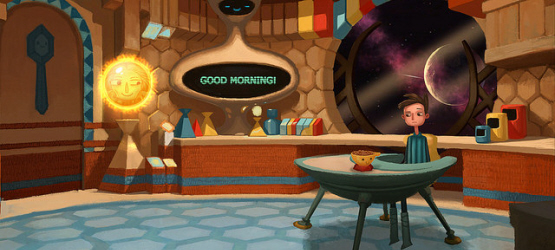
Talk is cheap. Fans can say how much they want Shenmue III to happen. They can say how great Double Fine’s Broken Age looks. They can say they’d love to revisit Harmonix’s Amplitude. But saying those things doesn’t fund the project. It doesn’t recoup the costs that the developer puts into creating the product. Good intentions aside, these developers create these games as a job. They money made pays their bills and puts food on their tables. So when they make something that doesn’t sell, it becomes a problem, and amazing studios have to turn off the lights and shut their doors. Kickstarter gauges interest in a far more reliable way than reading through forums or comments sections.
It was revealed recently that Double Fine will just be breaking even with Broken Age, even after a stellar Kickstarter backing of $3.3 million. You’d think that any extra sales would be profit for the developer, but the Kickstarter funding was not actually the full costs for the game, and Double Fine put a large amount of their own money on the line to make Broken Age the game that they wanted it to be.
Kickstarter backers are not funding projects without reward. At a certain tier, backers usually get the game, often at a discounted price than if they bought it upon release, so in fact, the people funding the game are the ones that are interested in seeing a project happen, and it’s a glorified pre-order to support something they believe in. So regardless of whether the funds can come from elsewhere, Kickstarter is a way of making fans put their money where their mouth is, proving appeal and getting them to take an active part in development of beloved projects. Is it such a bad thing that developers want to make sure that people’s interest in their project is more than just talk?

Dan: That is precisely why Kickstarter is becoming such a useful tool for developers of all sizes. We as an industry used to be completely at the mercy of investors, but rarely anyone outside of the hardcore even knew they existed. What this means is that, while you would love to have X game have Y feature, maybe that said option would be too risky for the expense, since there is no guaranteed way to measure sales before release.
At this point, I am sure someone will spout something about pre-orders being a method to gauge excitement, as well as reading the comments section. But, honestly, do you really trust everything you read on the internet? There is a massive tendency for people to hype things up but not purchase them, or tear them down and invest all of their free time playing it. Everyone’s favorite game of the last year, Destiny, is a prime example of this. As given the reception that we see from the comments section over and over again, you would imagine that the game would be a complete flop, but that isn’t the case. The reality is that most people’s mouths are not attached to their wallets.
The issue of course with pre-orders is that very few people will put money down on a product when a project is still needing funding. There is also the issue that pre-orders usually don’t charge people before the title ships, which defeats the ability for a studio to get funding when it really needs it. There are massive operational costs that every studio has to face, and if they don’t have a major publisher backing them, it can be very easy for the doors to get shuttered. Which is another reason why we see so many back room deals about exclusives, or DLC priority that so many fans complain about. Those are just the realities of doing business.

What about something like Shenmue III? With an announcement at Sony’s E3 conference, it has to have enough backing to make it worth the cost of production, right? Well, given that Shenmue cost an estimated $40 to $70 million to make in 2001, during a time when the average game cost was significantly less than it is now, it would be hard to fault anyone for not picking the check up on a sequel right away. Also, taking into account that the original only moved around a million copies when it was groundbreaking, and the competition wasn’t nearly as stiff, there are just too many holes to be confident in a project like this, which is where the Shenmue 3 Kickstarter comes in.
The thing about all of this that I find the most interesting are the people who are complaining about pub-funded projects. If a project isn’t something you want, don’t pledge any money towards its development. If you are excited about a project, then feel free to reserve your copy and possibly get some exclusive stuff for being ahead of the curve. If want to wait and see, guess what? You can do that too. Sites like Kickstarter are not a bane to the industry, they are a tool that give people the same options they have at the store when looking to pick something up. So, if you are going to complain, complain about having to wait because you are super excited and hate waiting, otherwise, why do you care?
What do you think of the Kickstarter trend? Should developers be looking to their fans to help make projects a reality? Let us know in the comments below, email us at DailyReaction@PlayStationLifeStyle.net or kickstart some Daily Reaction ideas on Twitter @Foolsjoker and @Finchstrife.
Check out more of us reacting daily on Daily Reaction here.
Daily Reaction: The Slideshow
-
Are Villains Really the Star of the Show? – The Joker, Call of Duty and Until Dawn

A great hero is nothing without an opposing force to drive him, her, or it forward, and we explore the villains, antagonists, and foes in both likely and unlikely places.
-
PS Plus Vote to Play – Are We Generalizing Indie Games?

The term "indie" has been slung around the industry to mean low budget garbage, but are we being unfair to a subsection of the industry that leads in innovation and creative freedom?
-
How Sharing Is Changing the Industry – PSN and the Share Button

The ability to easily share our experiences has vastly changed how we game and how the rest of the world perceives video games. Just how much is sharing changing the gaming landscape?
-
Cracking Down on Xbox One Cloud Computing

Despite the punny title referencing Crackdown 3, we actual drool over the possibilities that the cloud can offer as Microsoft shows off their latest footage featuring multiple servers worth of full destructibility in the world, while we also cite some minor concerns we may have with the tech.
-
Microsoft’s gamescom 2015 Press Conference Impressions

Microsoft finished their 2015 press conference at gamescom and it was a solid showing. Here are our blow-by-blow impressions of what Microsoft had to show off.
-
Guitar Hero Live and Rock Band 4 – Rhythm Games’ Encore

Rhythm games are coming back, but do gamers want the encore? Find out more about our history with the genre and what we are (or aren't) looking forward to when plastic instruments make a comeback.
-
Can a PlayStation Plus Voting System Make Gamers Happy?

Trying to appease unhappy gamers, Sony is giving them a choice to vote on the free Plus games for certain months. Will gamers still find a way to complain, or will this help ease the pain of feeling slighted by "bad offerings?"
-
Ouya’s Downfall and the Home Console Market

R.I.P. Ouya. We hardly even knew ya. In this edition we throw back all the way to the first Daily Reaction that talked about the Ouya and how it might be able to alter the gaming landscape. Have our views since then changed?
-
Are Gaming Accessories Important? VR, Fight Sticks and Gaming Headsets

Peripherals such as headsets, VR, plastic instruments, and motion wands can alter the way that we experience games, but are they required or even important to the gameplay experience?
-
Console vs PC: Rounds 1 and 2

Read the Daily Reaction Part 1 here.
Read the Daily Reaction Part 2 here.Console gamers and PC gamers often butt heads on which is better, but which one is truly the victor? We examine the pros and cons in multiple aspects of these platforms in this two part article.
-
Kickstarting Shenmue III, Broken Age, and More – Money Where Your Mouth Is

Kickstarter is a platform that can be used to gauge market interest by requiring consumers to put their money where their mouth is. Is this a good home for games that are demanded, but may not be financially viable?
-
How Important Is 1080p and 60fps and Overall Graphical Fidelity?

Graphics and visual fidelity are a massively debated factor in games, with some people attributing a high value to the magic numbers of 1080p and 60 frames-per-second. Is there a point where visual fidelity just isn't as important as other factors?
-
Clamoring for Information: The Desire to Know More

We're constantly pawing at any new bit of information that we can find out about games, but the information ebbs and flows in our industry. Does our desire to know more cause releases to be little more than a flash in the pan?
-
Remembering Our Giants – The Loss of Nintendo’s Satoru Iwata
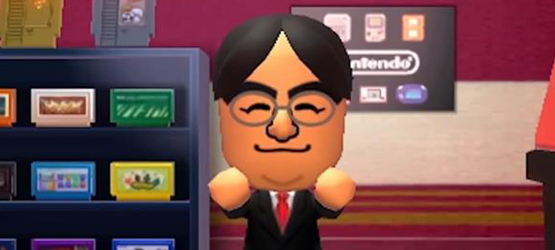
Nintendo's President and CEO has passed away, which makes us realize the fragility of life and relative infancy of the gaming industry.
-
A Dangerous Minefield of Video Game Spoilers

There are certain parts of an experience that hinge on the unknown, the mystery, and the surprise. Metal Gear Solid 2 swapping Snake out for Raiden? Aeris' fate in Final Fantasy VII? These are just a small sampling of the kinds of things that can have an impact if they are spoiled prior to a first experience and we're looking at how the unknown crafts a sense of wonder.
-
PSN Down - Does it Matter?

So the PSN is down again. Maybe not right now, but if history has taught us anything, it's that Rome wasn't built in a day and the PSN goes down periodically. Does the loss of our network connection really matter that much though?
-
The Last of Us 2: What We Want and What We Don't

Nolan North has seemingly outed the existence of The Last of Us 2, and while Naughty Dog and Troy Baker both claim ignorance, we wanted to share our conflicting thoughts on what we want and what we don't want in a sequel to one of the greatest PlayStation games ever.
-
How Technology Will Push the Horror Genre Forward

P.T. may be a distant memory, but new and coming technologies could change the face of horror games as we know them, allowing for fresh and immersive ways to be scared.
-
How Early is Too Early to Announce a Game?
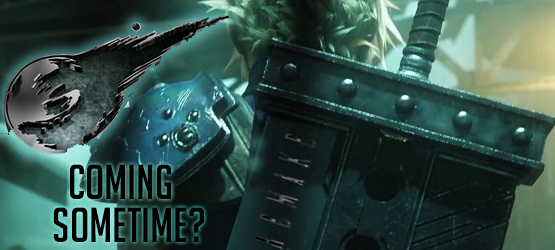
When should developers and publishers reveal their games? Can the strategy for timing between reveal and release impact a game's development and sales performance?
-
Has Nintendo Stepped Down From the Big Three?

Nintendo, Sony, and Microsoft have long been considered the "Big Three" in the console games market, but has Nintendo abandoned their seat at the table?
-
Is Backwards Compatibility Forward Thinking?
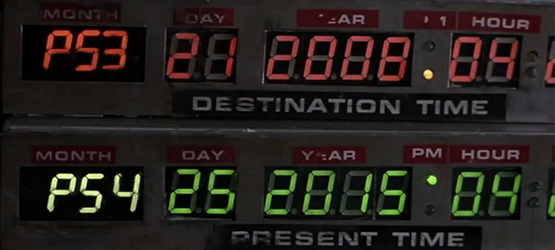
Microsoft announced backwards compatibility for the Xbox One at E3 2015, but is the time and money spent to make it happen forward thinking for the console market?
-
Oculus Rift vs. Project Morpheus - Pre-E3 Announcements

Project Morpheus and Oculus Rift are the primary contenders in the battle fro VR supremacy, and we compare the currently known specs and features.
-
Games, by Gamers, for Gamers

Many of the video game industry's biggest names are gamers themselves, and we talk about the importance of games by gamers, for gamers.
-
The Evolution of Discovery

Games have become about something more than simple high scores or arcade competition. We explore the evolution of the ability to discover in video games.
-
Countdown to E3 2015: Tips on How to Spend the Next 10 Days

The wait for E3 can be a difficult one, so we're offering you some ways that you can make the wait more bearable. Are you reading this after E3? There are still plenty of entertaining pictures to accompany each suggestion. You can't go wrong with a Reggie Photoshop!
-
The Pros and Cons of App Based Extended Content

Some games have expanded beyond the screen in our living room by allowing our phones to connect with the game. Which ones are successful and which ones are unnecessary?
-
The Strategy Behind Having E3 Press Conferences
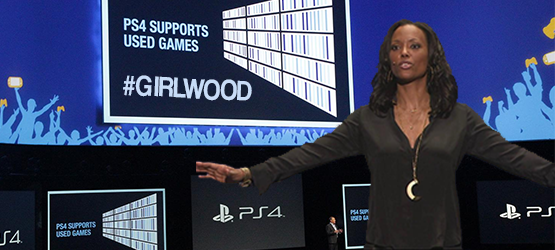
May I have your attention please? If you'll direct your eyes to the center of the stage, we'll be talking about why the major players in the industry hold E3 press conferences.
-
The Difficulties of Keeping an Embargo

As games journalists we have access to privileged information that we may not be able to reveal. Finding a balance between bringing content to our readers and maintaining positive PR relationships is crucial to our continued operation.
-
Unfair Bullying of Developers Over Game Updates

Game updates can create a stream of consciousness that a game is broken or that a developer took the lazy route during development. Is this treatment fair, or is the advancement of technology to allow for these updates an incredible thing?
-
Tempering E3 Expectations

Building up expectations to unreasonable levels can lead to disappointment when they are not met. Expect us to talk about tempering those expectations to enjoy every announcement, even the unexpected.
-
Evaluating The Witcher 3's Graphical Downgrade

Accusations of The Witcher 3 being downgraded graphically from its reveal trailer have caused a bit of a stir, and we're taking our own look at the claims.
-
The Adventures of Dynamic and Static Storytelling

Dynamic storytelling allows for more player freedom, but limits the kind of story you can tell. Static Storytelling let's creators have control of the story, but is an on-rails experience for players. Which is preferred?
-
Reigniting Destiny's Fire with House of Wolves

Did Destiny's second expansion reignite a fire that was snuffed out by The Dark Below?
-
Why Microsoft has the Right to Brick Consoles
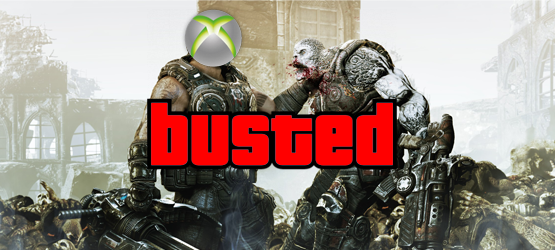
Do you ever read the terms of service? perhaps you should start, because we're looking at why companies may have the right to lock you out of content you think you own.
-
Always Online - The DRM Compromise

Advancements in technology are giving us increasingly connected worlds in our games, but are online components just hiding Digital Rights Management?
-
The Value of Gaming - How Much is Your Time Worth?

We spend a lot of money and time on our favorite hobby, but how do we measure the value of the money and time we spend on the games that we play?
-
The Backlog Problem
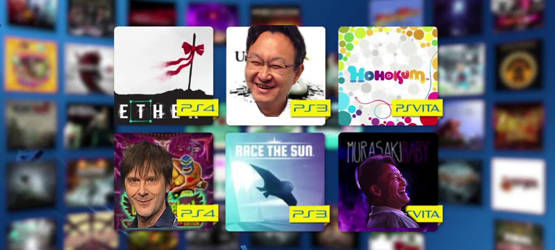
More and more games are coming out, more than we have time to play. With the rising number of games, there is also an increase to games that we want to play. Do we go back, or do we leave them behind?
-
Narrative vs. Experience - How are the Best Stories Told?

Would you rather be told a story or experience it for yourself? Is there a balance in a game telling you about a narrative point versus playing through it?
-
What Makes a Perfect Star Wars Game?

Everybody loves a good Star Wars game, but what makes the best Star Wars game? We take a stab at what we want to experience and what combined elements would bring balance to the Force.
-
Has PlayStation's Powers TV Show Failed?

Numerous mixed reviews and a lack of solid marketing have left the critical future of Powers in limbo. Though there will be a season two, we explore whether the series has already failed in its intention to bring a streaming exclusive to the PSN.
-
Information Leaks - Do They Hurt the Industry?

Games are a huge endeavor, and as such, information is not easy to contain. If something gets leaked outside of marketing's planned strategy, how does that impact the developer, publisher, and the rest of the games industry?
-
HD Remastered Edition - Does Recycled Content Hurt the Industry?

Daily Reaction is back in a new form, and our first post is talking about HD remasters and the trend of making what's old new again. Should we be living in an HD version of the past?








